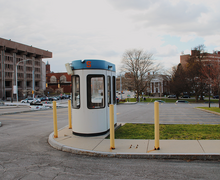Letter to the editor: Dimon represents corporation with strong anti-environment policies
It is important to consider our own individual carbon footprints on Earth Day. But why not also take a moment to check up on the carbon footprint of large business entities? JPMorgan Chase & Co. funds six of the top eight mountaintop removal coal mining companies in the country. This method of mining essentially shears off mountaintops. It pollutes the air and water, destroys ecosystems and adds to our country’s deforestation. Not to mention, JPMorgan has major business deals with Massey Energy Company, the corporation that has come under national scrutiny this month for repeatedly cutting corners and violating safety regulations at the expense of workers’ lives. Other banks, such as Bank of America and Wells Fargo, have stopped funding this practice, but JPMorgan continues to do so.
When those who oppose Jamie Dimon as Syracuse University’s 2010 commencement speaker bring up the point that he represents a corporation with such strong anti-environmental policies, his supporters ask us if we like our cheap electricity. But the reality is that if the government stopped subsidizing coal and the coal companies spent the money to follow safety regulations, paid to clean up the environmental mess they make, paid the coal workers a reasonable wage, and stopped externalizing those negative costs, coal would be much more expensive.
Syracuse University claims to value sustainability. It is the theme of this year’s SU Showcase. But where is the consistency? It is hypocritical of Chancellor Nancy Cantor to invite Jamie Dimon, the CEO of a corporation that bankrolls the vast majority of this destructive and unsustainable practice, to speak at commencement. In addition to the environmentally conscious SU students, let us not forget that this is also the commencement for the State University of New York College of Environmental Science and Forestry, which advocates for responsible environmental management and leadership.
To those who are working toward a ‘greener’ future, we ask if the greenery of our countryside should be destroyed for the sake of the greenery in our pockets.
The Take Back Commencement Committee
Published on April 21, 2010 at 12:00 pm





